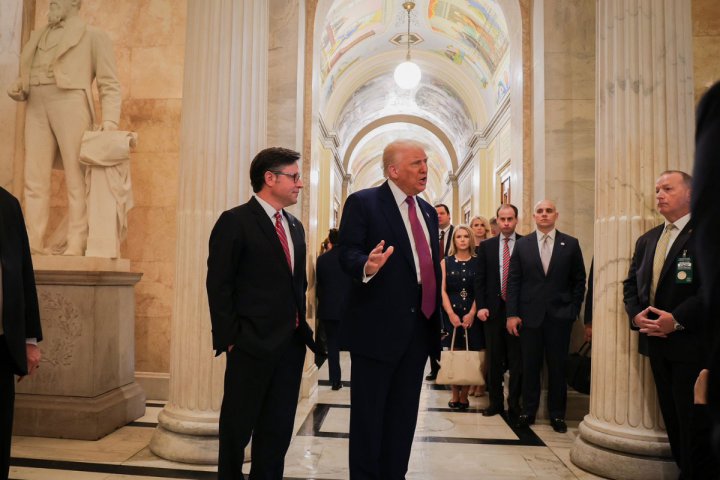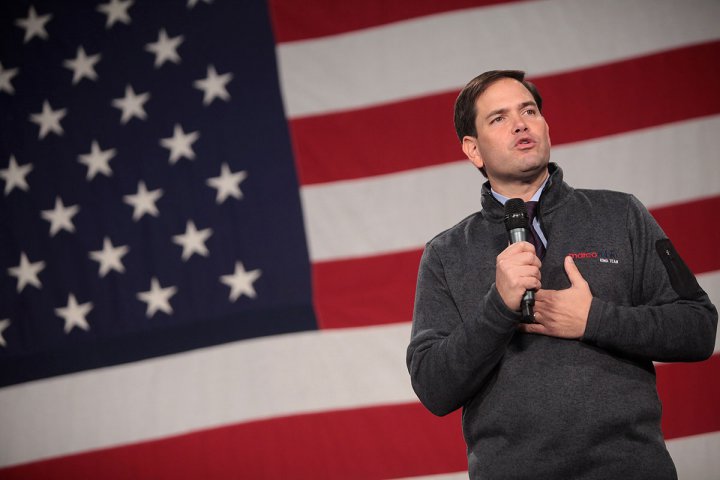Not Everything Trump Does is Good. “One Big, Beautiful Bill”
The bill is about changing the fiscal policy to reduce the budget deficit.
That’s right, but it finally adds trillions to the national debt.
US governments increase the national debt since the 2000s.
That’s right, but it finally adds trillions to the national debt.
US governments increase the national debt since the 2000s.

Image by Speaker Mike Johnson, Public Domain via Wikimedia Commons
On May 22, House Republicans have passed “One Big, Beautiful Bill,” also called the “Spending and Tax bill” which is the foundation of Mr. Trump’s domestic policies. They didn't need the votes of the Democrats and the law passed by a margin of just one vote. It basically revises the incomes and expenditures of the US federal budget in order to reduce the budget deficit and finance programs needed by the Republican government - the fight against illegal immigration, in particular.
Yes, the country's fiscal policy (and the monetary policy, of course, too) needs to be changed, Mr. Trump and the authors of his guide to action — Project 2025 - are absolutely right. And most Americans voted just for the change in the last presidential election.
However, any change can be for the better or for the worse.
………
What is in the bill legislators are passing/not passing?
“Spending and Tax bill” follows two main Mr. Trump’s priorities which he promised to the Americans: tax cuts and the fight against illegal immigration. However, Mr. Trump plans to take funds for this from other federal programs, mainly from Medicaid and SNAP (food stamps) while forcing the states to pay more for them. The bill also cuts funding of President Biden's clean energy initiatives and repeals his student loan forgiveness program, creates “MAGA” savings accounts for newborns, raises taxes on colleges and universities, increases spending for military and homeland security while pulling back on federal spending in some other areas.
House Speaker M. Johnson has said after the vote:
"Today the House has passed generational, truly nation-shaping legislation to reduce spending and permanently lower taxes for families and job creators, secure the border, unleash American energy dominance, restore peace through strength and make government work more efficiently and effectively for all Americans… House Democrats voted against all of that."
It sounds good. And now the Democrats are “bad” again “for all Americans,” just like the Republicans were “bad” six months ago. I wonder which party is really “good” “for all Americans”?
The people as usual are divided into parts and either support “their” party point of view on the bill or do not pay attention to the eternal quarrels of their elites, but in any case the people do not understand the essence of the new “generational, truly nation-shaping legislation.”
The bill must then be considered by the Senate and Mr. Trump urges the senators to get his big tax bill done by July 4.
……….
The main idea of “One Big, Beautiful Bill” and different points of view at it.
The main idea of the new Mr. Trump’s “Spending and Tax” legislation (as well as the tariffs on imported goods) is simple: raising federal revenues and cut spending which is, of course, right. Many Republicans support the bill and say that it’s necessary to deliver on Trump’s economic agenda and to root out waste and fraud.
However, nonpartisan Congressional Budget Office states that Mr. Trump’s “One Big, Beautiful Bill” while providing some tax cuts (mostly for wealthy taxpayers), ends up adding $2.4 trillion to the national debt over next 10 years:
“Overall, the CBO and the Joint Committee on Taxation found that over a 10-year period, the legislation would decrease revenues by $3.7 trillion, while cutting net spending by $1.3 trillion — for a total of $2.4 trillion in new red ink.”
Other angry, but professional tongues give similar figures for the increase of the US national debt by 2034 after the new law is passed: Budget Lab – by $2.4 trillion, Tax Foundation - by $2.6 trillion, Penn Wharton’s Budget Model – by $2.8 trillion.
Different experts as usual see the bill differently depending on their party sympathies. The country is again divided approximately in half, just like the voting in the House of Representatives.
The President's best friend Elon Musk has recently blasted Mr. Trump’s “Spending and Tax bill”, calling it “a disgusting abomination” that would burden the country with “crushingly unsustainable debt.”
Democrats in the House voted unanimously against the new law.
"Even after the biggest cuts to health care and food assistance in U.S. history, the Republican bill for billionaires would still add a historic amount to our debt — all to give the ultra-rich more tax breaks," Rep. Brendan Boyle, D-Pa., the ranking member on the House Budget Committee, said in a statement. "Republicans cry crocodile tears over the debt when Democrats are in charge — but explode it when they’re in power."
Mr. Boyle is absolutely right here about one thing: Democrats and Republicans alike demand an increase of the debt ceiling under “their” president and prevent this while in opposition. Thus, the US Congress has increased the debt ceiling 78 times since 1960, 49 of those increases were taking place when a Republican was president and the other 29 during a Democratic presidency.
……….
How to determine the truth about “One Big, Beautiful Bill?”
It is really "big" and nobody wants to read it. How to understand who is right/wrong here?
Basically, it's simple, although long: you may not listen to experts or politicians at all, but then you need to feel the main thing. And what is the main thing for you?
It is, as always, the answer to the question: do you like living under Republican’s rule (including adoption and implementation of their laws)?
Here, unfortunately, you have to wait until the next elections, and then, after couple of years to look and see whether your family got better (or worse) living with the Republicans, based on the totality of your subjective feelings. And don't listen to politicians - both ruling parties always blame each other for all the problems. So, if you feel your life has become better - vote for the Republicans, if it has become worse - go for the Democrats.
This is the essence of democracy.
In my opinion, it’s correct to vote against both of these parties because I see they have been ruining the country together for many years, constantly shifting the blame onto each other.
The second way: you can also listen to experts from both sides and highlight for yourself the main thing that you consider the greatest evil in this bill. Just try not to get into details, but look at the issue broadly to see the whole picture. This is macroeconomics and you will get confused with lots of details and miss the main thing. To understand, you only need common sense and desire to spend some time for collecting information, but people are usually busy with their own survival.
Of course, you don't have to figure out all that mess. The people elected their representatives to the government and thus delegated their powers to them, so let them figure it out because they get paid for that. This is called “representative democracy”. However, in such a case, the people remove themselves from governing their country and receive one (like in Russia, China), two (in the US) or several (in Germany, France) uncontrolled and irreplaceable elites, who make decisions for their nations, pursuing only their own selfish interests. This divides many nations into parts and leads them to a dead end which is now becoming especially noticeable.
……….
My main indicator of the ill-being of a country, enterprise or family.
I once identified for myself the main indicator of the ill-being of any country/enterprise/family. I always believed that debts are bad. Why?
Because, firstly, they indicate the inefficiency of the country/enterprise/family, and secondly, «incurred debts exacerbate internal conflicts that inevitably tear any union (family, business or country) apart».
I find it interesting to see that many in America are talking about the country's excessive debts now, although the policy of debt accumulation is being pursued actively by all (both Republican and Democratic) governments since 2001.
Nowadays, many countries live by constantly borrowing money, this is considered to be “smart,” so the global debt is constantly increasing and now amounts to over $324 trillion. This means many countries are doing bad and nothing good will happen to them.
……….
A theory to support my main indicator of the state's ill-being.
The US federal budget deficit in 2024 was $1.8 trillion.
For 6 months of 2025 it already grew to $1.3 trillion, the second highest six-month level on record. Every federal government spends more than it collects in taxes in each fiscal year, so it is forced to continually borrow more or less money and raise the federal debt ceiling accordingly. That's why the US Department of the Treasury issues Treasury securities (bonds, bills, notes) to help finance the federal government's operations. The US debt obligations are sold through an auctions conducted by the US government and private investors, foreign central banks and large international commercial banks buy them for their investment portfolios.
US debt obligations have always been considered a very safe investment and that confidence was supported until recently by the highest US credit rating from the world's leading credit rating agencies. This rating actually shows the probability of default (refusal to pay off the debts) of a country or enterprise. The highest rating means that the probability of default is very low. Therefore, many private investors, banks and foreign governments keep part of their savings in US Treasury securities and the American bond market (also known as the debt market, fixed-income market, or credit market) is the most capital-intensive market in the world.
However, all US governments consistently spend more than they collect in taxes in recent years, resulting in a federal budget deficit at the end of each fiscal year. The sum of these annual deficits over the years adds up to the country's ever-growing national debt which now amounts to almost $37 trillion. This debt must be paid back with interest by the US government and this is becoming a problem. In 2024, federal interest payments exceeded, for example, the US Defense spending for the first time in the US history.
Thus, the direction of the country's movement becomes clear - America is not just stagnating, it’s degrading. The country has been living beyond its means for a long time, it is getting deeper into debt and that is why respected international credit rating agency Moody's recently has rightly lowered the US credit rating by 1 notch - to Aa1. Actually, several independent credit rating agencies around the world have sequentially downgraded their credit ratings for the US since 2011. This means that the country's economy as a whole is inefficient, the likelihood of default increases, and borrowing money will become more expensive in the future.
“One Big, Beautiful Bill” will most likely add another $2.4 trillion or more to the US national debt over 10 years, meaning the country's economy under Republican rule will keep being unprofitable, the national debt will grow, the credit rating will be downgraded again, borrowing will become even more expensive, etc. This is a road to nowhere.
Indeed, it is time to put in order the US economy, but not with the help of Mr. Trump’s “One Big, Beautiful Bill.”
The American people, unfortunately, don't pay much attention to all these credit ratings which nevertheless clarify a lot. These are professional economists' assessments of the performance of various US governments over time, and they are steadily getting worse for America. However, on an existential level many Americans may feel that something is wrong and express dissatisfaction with their declining standard of living. For example, my neighbor Patrick, who mowed my lawn, once told me that he has to work now more than before and he earns more than before, but his family can afford less than 10 years ago.
This is because of poor management of the country's economy by alternating US governments (their wrong monetary and fiscal policies), and the current Republican government is not an exception.
……….
What will happen to America in the near future? “Crack in the bond market,” surge of inflation and rising prices.
About one-third of all existing US debt held by the public (around $9.3 trillion) is scheduled to mature between April 1, 2025, and the end of March 2026. This money has to be paid, but where to get it?
There are two methods that all US governments use all the time:
1. Department of the Treasury will issue new securities, i.e. it borrows money again, but… What if nobody will buy them? Lately, investors have been scared by Mr. Trump’s sharp moves with import tariffs and were reluctant to buy American Treasury securities. This led to their reduction in price and the Treasury had to increase their profitability up to 4.5-5%. Also, the US dollar depreciated a little against other major world currencies in connection with all this.
2. Then the Fed will have to buy new-issued Treasury securities for $9.3 trillion of the US government debt (it is called “Quantitative Easing”), creating money for that as usual “out of thin air.” This means that the Fed will put $9.3 trillion of extra “surrogate” money into circulation within a year, creating the inflation which all US governments and all Federal Reserve Boards are heroically fighting against, and which causes the devaluation of the US dollar and rising prices in the country.
The most likely scenario is a combination of points 1 and 2.
Investors will still buy some Treasury securities and then the Fed has to buy less than 9.3 trillion. This means that inflation and the associated depreciation of the US dollar and price increases in the country will be less. Ok.
One of the main complaints of the people about the last US government were inflation and rising of the prices. Americans want Mr. Trump to focus on fighting rising prices, not import tariffs, but …
The US monetary policy is aimed at creating inflation. It is even called "inflation targeting" and is implemented by the Fed. And now the Fed will have to buy Treasury securities for a huge amount, i.e. the state buys its debts from itself for money taken out of nothing, otherwise the country will go bankrupt... Even Mr. Trump can't cope with all that. Especially since he soon will not be able to blame everything on Mr. Biden.
Overall, I think that the surge of inflation and rising prices are inevitable and let's see how the Americans will react to the failure of yet another government led by Mr. Trump. From my observations, people can tolerate all sorts of ugly things for quite a long time due to their ignorance, blindness and inability to vote correctly.
CEO and Chairman of JPMorgan Chase J. Dimon also spoke recently about the upcoming crisis of the US bond market.
“You are going to see a crack in the bond market, OK?” he said in a May 30 speech at the Reagan National Economic Forum.
Mr. Dimon warned that a crack in the bond market is “going to happen” after the US government and Federal Reserve “massively overdid” spending and quantitative easing.
Mr. Dimon himself does not know when the crisis will occur - in 6 months or 6 years - but he and his bank are “not going to panic, we’ll be fine. We’ll probably make more money and then some of my friends will tell me that we like crises because it’s good for JPMorgan Chase — not really.”
Well, many people make money on the growing market, some can do that on the falling market, and gurus like Mr. Dimon can do both. However, I do not think that Mr. Dimon and his bank will be able to make money on the real big financial crisis that will inevitably cover the US in the foreseeable future.
……….
What will happen to America in the long term? A major financial crisis, triggering a global one.
I think that relatively soon (within 6 years which Mr. Dimon spoke about, although Mr. Trump can speed up the process) a scenario will be realized that no one wants, but which America will come to because of the fact that various US governments keep incurring debts and following the vicious policy of inflation targeting. The US national debt (and interest payments) will only increase in the future, the inflation will depreciate the US dollar and impoverish the Americans. This systemic crisis will deepen over time.
Sooner or later, US legislators will fail to raise the debt ceiling timely, or America will no longer be able to borrow money because of the reasons described above. Then the “world economy #1” will not be able to pay its debts and go bankrupt, and this will trigger the global financial crisis like it happened in 2007-2010.
Inflation devalues the US currency, and the US debt and stock markets have a strong influence on the global financial market due to many countries have invested their funds in US stocks and treasury bonds which are denominated in US dollars. In addition, the US dollar is the world's reserve currency and about half of all payments are still made in USD globally.
Financial markets of different countries are interconnected in our globalized world, and the collapse of one of them, even not as big as the US, can crash the entire global financial system.
I described the consequences of all that for America and the world in some detail in my article “The sword of Damocles over America.”
The period of Big Disintegration in our civilization is coming.
Wikipedia gives a similar picture of the future financial crisis in the US and in the world in its good article about the debt-ceiling crisis in the US in 2023:
“If the government had run out of funds, the Treasury would have had to either default on payments to bondholders or immediately curtail payment of funds owed to various companies and individuals that had been mandated but not fully funded by Congress. Both situations had been expected to result in a global economic meltdown.”
Comment
✚ Add comment







